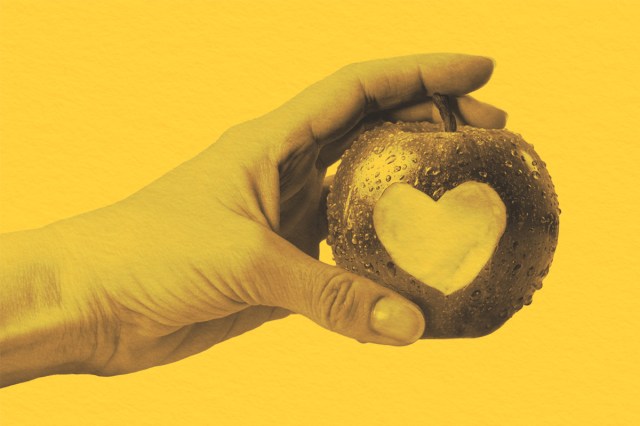
An idiom is a phrase in which the literal meanings of the words don’t translate for the overall intention of the saying. “Apple of my eye” is a term of endearment implying an individual is cherished above others. It can be used romantically or platonically, but always with affection and sometimes suggesting that said “apple” is the center of their world, as in, “His grandson was the apple of his eye.” You might think it’s an idiom because your eye does not contain a literal apple — but if we look at the history and etymology of this phrase, we find a literal meaning that pulls it away from idiom territory.
The phrase was popularized by an appearance in A Midsummer Night’s Dream (c. 1600), Shakespeare’s romantic comedy of errors in which magic and mistaken identity cause lighthearted chaos. Mischievous fairy king Oberon speaks these lines while dripping love potion into a sleeping man’s eyes:
Hit with Cupid’s archery,
Sink in apple of his eye,
When his love he doth espy,”
In 1611, the phrase appeared in the King James Bible in Deuteronomy 32:10: “He kept him as the apple of his eye.” The apple was likely the literal center of the eye in Shakespeare’s version, but the biblical reference was metaphorical.
However, the first documented English-language appearance of the phrase is attributed centuries earlier to King Aelfred the Great of Wessex in 885 CE, beginning the interpretation of the apple referring to the pupil of the eye — the small black dot at the center of one’s eye. In Old English, æppel could refer to anything small and round, including both the fruit and the pupil.
Giving further credence to a literal interpretation of “apple of the eye,” King Aelfred’s Old English had been translated from the Latin pupilla oculi, meaning “pupil of the eye.” The evolution of “apple of the eye” from a literal eye pupil to a figurative term of endearment makes sense to me. Apples hold a prime place in many cultures. The Greek goddess Aphrodite was associated with apples, and in the Bible, they are the forbidden fruit of the Garden of Eden. Students bring an apple to a beloved teacher, and an “apple a day keeps the doctor away.”

















